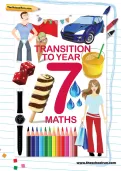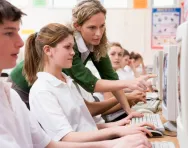Important update from TheSchoolRun
For the past 13 years, TheSchoolRun has been run by a small team of mums working from home, dedicated to providing quality educational resources to primary school parents. Unfortunately, rising supplier costs and falling revenue have made it impossible for us to continue operating, and we’ve had to make the difficult decision to close. The good news: We’ve arranged for another educational provider to take over many of our resources. These will be hosted on a new portal, where the content will be updated and expanded to support your child’s learning.
What this means for subscribers:
- Your subscription is still active, and for now, you can keep using the website as normal — just log in with your usual details to access all our articles and resources*.
- In a few months, all resources will move to the new portal. You’ll continue to have access there until your subscription ends. We’ll send you full details nearer the time.
- As a thank you for your support, we’ll also be sending you 16 primary school eBooks (worth £108.84) to download and keep.
A few changes to be aware of:
- The Learning Journey weekly email has ended, but your child’s plan will still be updated on your dashboard each Monday. Just log in to see the recommended worksheets.
- The 11+ weekly emails have now ended. We sent you all the remaining emails in the series at the end of March — please check your inbox (and spam folder) if you haven’t seen them. You can also follow the full programme here: 11+ Learning Journey.
If you have any questions, please contact us at [email protected]. Thank you for being part of our journey it’s been a privilege to support your family’s learning.
*If you need to reset your password, it will still work as usual. Please check your spam folder if the reset email doesn’t appear in your inbox.
Secondary school induction days: what to expect

It probably seems a long time since you dropped your nervous four-year-old off for their first taster session at primary school – and now you’re preparing for their move to ‘big school.’ There’s a whole new set of skills to master – from negotiating a timetable to paying for their own lunch – and many new people to meet.
To ease new starters in gently, secondary schools have an induction process where, during the summer term, Year 6 children spend a day (or sometimes two) in their prospective secondary school to familiarise themselves with the new environment and routines.
Why induction days matter
No matter how confident your child is at school, moving to secondary school can be a nerve-wracking process – not least because they’re going from being the biggest in the school to the smallest. ‘Secondary school induction days are very important for Year 6 children, as they help to remove anxiety so they settle more quickly in September,’ says Elizabeth Hitch, head teacher of Beaumont School in St Albans.


Download Year 6 to 7 transition packs
- English & Maths transition packs
- Practise journalistic writing, figurative language, persuasive text and more
- Revise key maths methods and concepts
Induction days – sometimes also referred to as transition, transfer or ‘jump up’ days – also give children an introduction to the very different structure of secondary school. ‘It helps them experience the new environment and what their life will be like at secondary school,’ explains Joanne Smith, assistant principal at the Folkestone Academy in Kent.
‘It sets the expectations for the future: students start to learn the routines of the new school and what is expected of them, which will inevitably be different from primary school. Students go home buzzing about their new school, and rather than dreading their first day of Year 7, they start to look forward to it.’
When are secondary school induction days held?
Each local authority has a set date on which all Year 6 children in the area spend the day at their new school. This tends to be in early July, before schools break up for the summer. The common date means that all children in that area are able to attend their induction day, regardless of which primary school they attend or which secondary they’ll be going to. On this day, children in Year 5 and below who are not yet moving to secondary school typically spend the day in their new classroom and with their new teacher, too.
If your child is to attend a secondary school in a different local authority area (such as a neighbouring county) or an independent school, their new school may have a different induction date. In this case, you should speak to their primary school to arrange for them to go to their induction day.
As well as the official induction day, some schools run additional activities to help children settle better in September. ‘We invite all students and their parents to meet their head of house in June for a 20-minute interview,’ says Joanne. Some schools take things further and offer summer schools and even residential trips for new starters.
What happens on an induction day?
The exact format of induction days varies from school to school. The day usually begins with an assembly for all new starters. Some place a large emphasis on fun, team-building activities such as quizzes, treasure hunts, PE and drama on their induction days; others give students the chance to follow a timetable and try out the sort of lessons they’ll be taking in Year 7.
‘Our students follow a timetable of activities with the other students in their house, and typically try out lessons such as science, PE, dance, music or French,’ says Joanne. ‘These lessons have more specialist teachers and equipment at secondary school, so they give children a different experience from what they’re used to at primary school.’
Students also spend time getting used to their new school environment. ‘They are involved in a variety of activities, including finding their way around the school, meeting the teachers and trying out the lunch system,’ says Elizabeth.
Children may complete some written or maths-based work during the day. ‘At our school, children usually spend some time with a curriculum teacher and do a piece of writing so we can gauge their ability level,’ adds Joanne.
Who will your child meet?
In short, lots of people! These might include the head teacher, head of house, head of year, form tutor, subject teachers and guidance managers. They’ll also meet other children who are about to start Year 7, and possibly others who are already at the school – for example, buddies or mentors from higher years.
It’s important to point out to your child that they are unlikely to spend the whole day with their primary school friends. Usually, children will spend most of their induction day in their new tutor group or house, which may include some children from their current school but will also include new starters from other primaries. At breaktime and lunchtime, they may be able to mix more freely with their current friends and other children from further up the school.
What should they wear and bring?
This will be explained in the school’s induction pack, which is usually sent out to new starters in June, but unless you’re told otherwise, your child will wear their primary school uniform. Depending on the activities planned, they may need to bring extra equipment such as their PE kit. Lunch arrangements also vary; in some schools, children bring a packed lunch or pay for a school meal in advance, while in others, they’re provided with a free school meal. ‘Lunch is free for all students on induction day, so they can taste the food at our academy,’ says Joanne. ‘They can bring their own lunch if they prefer, but we encourage them to experience our food.’
Tackling problems
Schools put a lot of effort into making induction days enjoyable for their new students, and most of the time, they help to ease children’s nerves about starting secondary school. However, if your child does have worries following their induction day, you can always phone their new school and ask to speak to their head of year, head of house or class tutor about their concerns. ‘In some cases, for example, we arrange additional visits for students whose primary schools have identified them as needing extra support,’ says Joanne. ‘But in general, it’s such a pleasure to see children grow in confidence throughout the day, and leave with huge smiles on their faces.’
BBC Bitesize has a range of starting secondary school resources offering support and information about all aspects of secondary school life for both parents and children.








